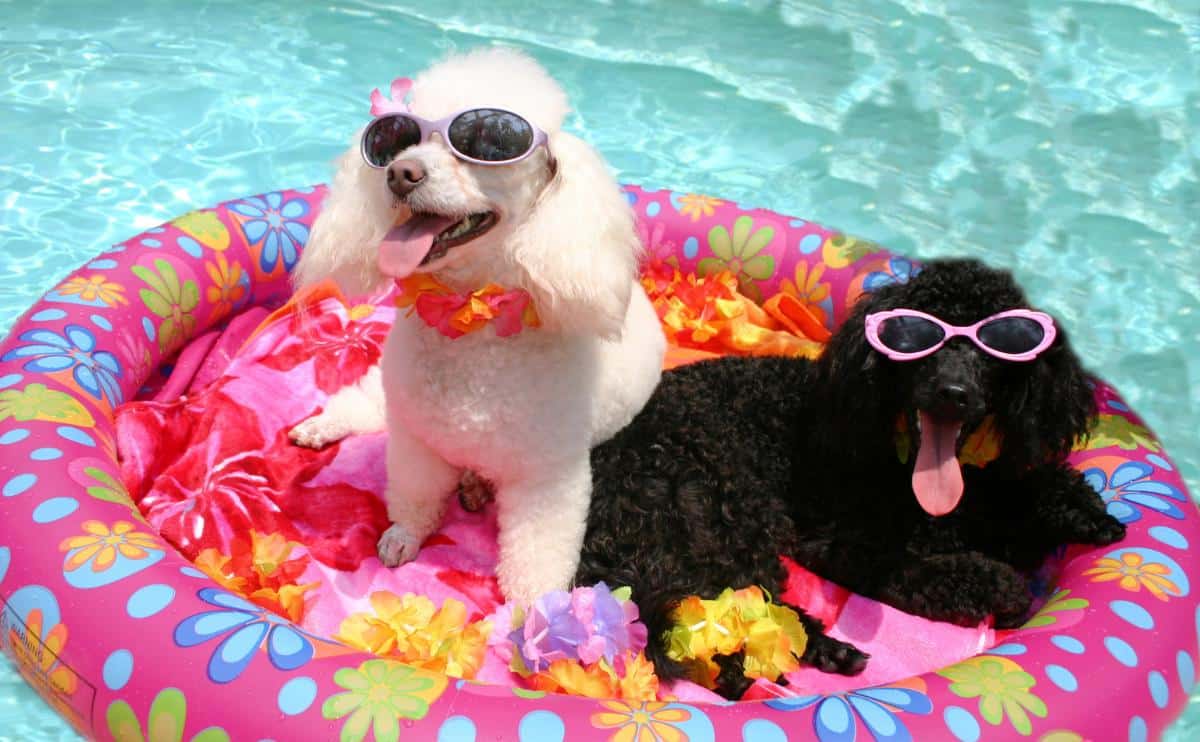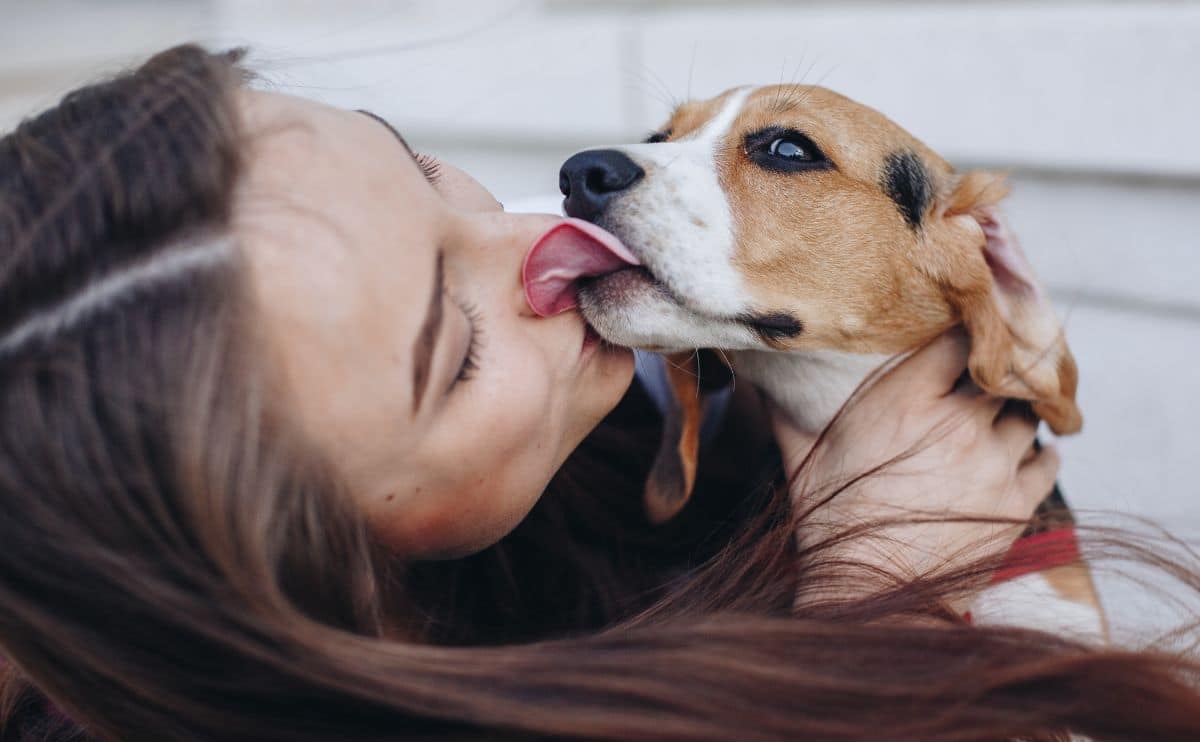Is Your Dog About to Explode? How Long They Can Really Hold Their Pee
When you purchase through links on our site, we may earn a commission. Here’s how it works.
Have you ever had your dog stare deep into your soul while you’re stuck in a meeting, silently pleading for a bathroom break? Or maybe you’re stuck in traffic, and your dog has been home alone for hours. You start panicking—has he peed on the rug? Is he suffering in silence? Has your carpet been transformed into an indoor lake? We’ve all been there. So, how long can dogs hold their pee? And more importantly, how long should they? As much as we’d love to believe our pups have bladders of steel, the reality is a little more complicated.
Table of Contents

There is more to it than just letting your dog out. It’s about preventing bladder meltdowns, questionable puddles, and that guilty “I tried my best” look from your pup. Whether you’ve got a tiny tornado of a puppy, a middle-aged couch potato, or a senior dog who suddenly thinks peeing inside is back in style, we’re getting into all our furry friends’ weird bathroom habits. Buckle up. This is one wild, slightly damp ride.
How Long Can Dogs Hold Their Pee? (And When to Worry)
Every dog is different. Some have bladders of steel while others act like they’re running on a two-minute timer. That said, there’s a general rule of thumb: adult dogs between one and seven years old can typically hold their pee for six to eight hours. But before you start scheduling bathroom breaks like clockwork, keep in mind that a dog’s age, health, size, diet, sex, and activity level all play a significant role in how long they can comfortably wait before turning your floor into a splash zone.
Puppies? Forget about it. Their tiny bladders have about as much holding power as a leaky water balloon, meaning frequent potty breaks are a must. Senior dogs, those seven and older, may only be able to hold it for two to four hours. Trust us, making them wait longer isn’t doing anyone any favors. While some young, healthy dogs might manage eight to ten hours, that doesn’t mean they should. Holding it in too long isn’t just uncomfortable. It can cause bladder infections, urinary tract issues, and even painful stones or crystals. Ideally, no dog should wait more than six hours before getting a chance to relieve themselves.
And let’s not forget the emotional toll. A dog desperate to pee isn’t just uncomfortable. These dogs become stressed, restless, and ready to take matters into their own paws. Whining, barking, frantic pacing, chewing up your favorite shoes, or even attempting an escape mission? These are all possible signs that your dog is seconds away from making their own indoor rainstorm. So, it’s best to keep those potty breaks on schedule for everyone’s sake, including your furniture.
When To Call The Vet
If your dog is peeing like a broken sprinkler or holding it in like they’re training for a world record, it’s time to pay attention. Frequent urination, going every hour, waking you up multiple times at night, or having accidents despite being house-trained could signal a urinary tract infection, diabetes, kidney disease, or even anxiety. On the flip side, if your dog hasn’t peed in over 10-12 hours or seems to struggle when they finally do, this could indicate a serious issue like a urinary blockage, bladder stones, or dehydration, all of which can become emergencies fast.
A vet visit is needed if your pup is straining, dribbling urine, acting lethargic, or showing signs of discomfort (like excessive licking or whining). Holding pee for too long isn’t just uncomfortable. It can lead to infections, bladder damage, or even rupture in extreme cases. When in doubt, trust your gut: if your dog’s bathroom habits suddenly change, something’s up.
How Often Should Your Dog Pee? A Quick Guide for Every Pup
How often dogs must pee depends on a few things, including age. Younger animals go more often, as do seniors. Generally, pups over one year to seven years old should go out once every six hours.
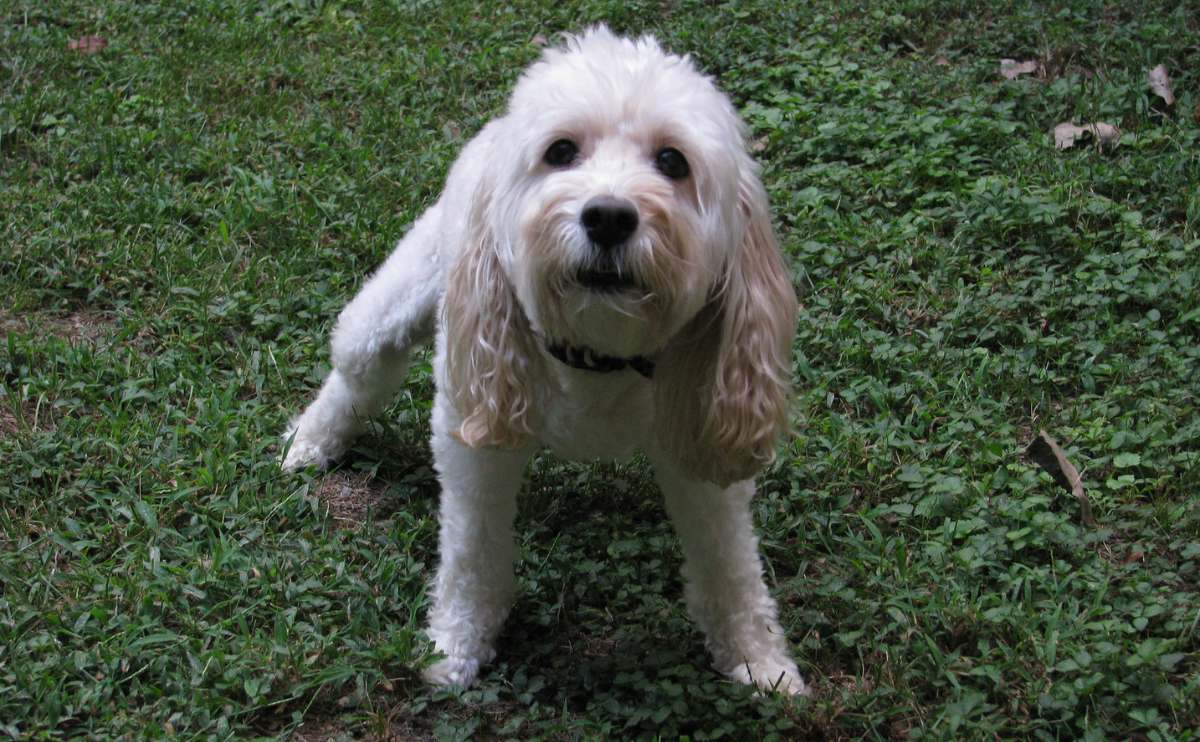
Puppies vs. Adult Dogs: Who Wins the Bladder Battle?
- Puppies: 1 hour for every month of age (e.g., a 3-month-old puppy can hold it for ~3 hours).
- Adult dogs: 6-8 hours (but should ideally go out every 4-6 hours). Dogs aged one year to seven years – every 6 to 8 hours. Those ages eight years to ten years need to pee every 4 to 6 hours.
- Senior dogs: Often need more frequent breaks due to weaker bladder control. Seniors over ten years old must relieve themselves every 2 to 4 hours.
- Expect to let your pup out between 4 and 8 times a day on average.
Does Size Matter? How Your Dog’s Size Affects Their Bladder
Regarding canine bladder control, size absolutely matters, and no, that’s not just an excuse for why your Chihuahua seems to pee every five minutes. Generally, the smaller the dog, the smaller the bladder, which means their ability to hold it in is more limited.
- Tiny dogs under 10 pounds (think Chihuahuas, Yorkies, and other purse-sized pups) usually need a bathroom break every 1 to 3 hours. Their bladders are about as big as a shot glass, so expecting them to last all day isn’t realistic.
- Medium-sized dogs around 30 pounds (like Cocker Spaniels or Beagles) have a bit more control, typically holding it for 2 to 4 hours before nature calls.
- Larger dogs between 40 and 60 pounds (such as Labs and Border Collies) can often last 4 to 8 hours, assuming they’re healthy and well-hydrated.
- Giant breeds over 60 pounds (think Great Danes and Mastiffs) tend to have the most impressive bladder control, sometimes going 6 to 12 hours without a break, though that doesn’t mean they should.
While larger dogs have an advantage in bladder capacity, holding it for too long isn’t good for any dog, regardless of size. If you’ve got a tiny pup, be prepared for frequent potty trips. And if you have a big dog? Just because they can hold it for half a day doesn’t mean they should. Letting them relieve themselves regularly is always the healthier (and happier) choice.
*These estimates pertain to healthy adults between the ages of 1 and 7 years.
Overnight Bathroom Breaks: How Long Can Dogs Hold It While Sleeping?
If you’ve ever been jolted awake by the unmistakable sound of frantic paw taps on the floor, or worse, the dreaded nose poke to the face, you know that some dogs handle nighttime bladder control better than others. On average, most adult dogs can hold it for about 6 to 8 hours, though a few bladder champions might stretch it to 10 hours, while others start doing the potty dance after five. It depends on the dog’s size and whether they chugged water like a marathon runner before bed.
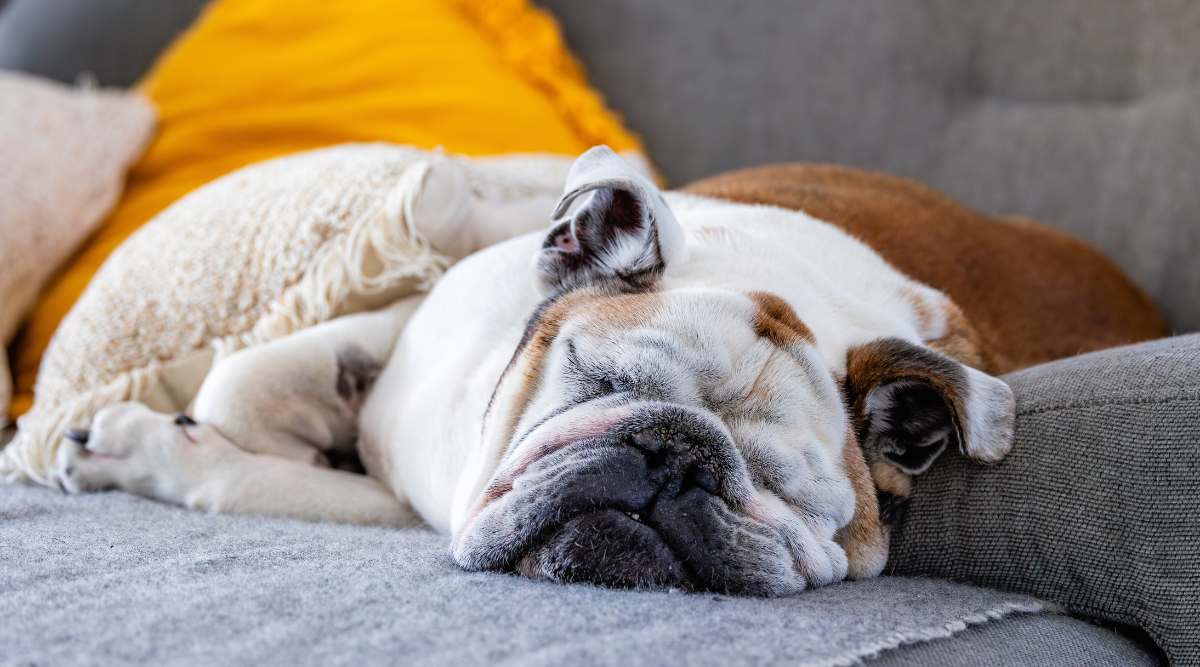
To help your dog through the night without a desperate wake-up call, let them out right before bed and limit water intake an hour or two beforehand. (Be careful, cutting off water isn’t healthy, especially if your pup is extra thirsty after exercise or dinner.)
Of course, not all dogs are created equal in the bladder department. Puppies and senior dogs struggle more with holding it in overnight. Puppies haven’t mastered bladder control yet, meaning you’ll likely be making late-night potty runs for a while. Senior dogs (around age seven and up) start losing bladder strength over time, even in their sleep, so expect more frequent bathroom breaks as they age. If your older dog suddenly starts waking up multiple times a night to pee, it could signal an underlying health issue, like a urinary tract infection, kidney problems, or incontinence.
What is the moral of the story? If you hear those tiny paws scrambling at 4 AM, don’t ignore it. Your dog’s bladder has limits, and nobody wants to wake up to an unexpected indoor accident.
Puppy Bladder Control: How Long Before Accidents Stop?
Puppies have much less capacity to control the bladder than adult canines. Young puppies have no ability to control this. As they age, they increase the length of time they can go between potty breaks. In general, expect a puppy to be able to hold pee for an hour per month of age once they have been house-trained. This is a general guideline, not a hard and fast rule. Puppies tend to drink and eat a lot more, so they feel the urge to go much more often.
Puppy Pee Schedule by Age: A Handy Bladder Control Chart
| Puppy Age | How Often They Need To Pee |
|---|---|
| Under one month | No bladder control |
| Under 3 months (assumes housebroken) | As needed, take out once an hour at least |
| 3 to 6 months | Once an hour |
| 6 months | Once every 1 to 2 hours |
| 6 -9 months | Every 2 to 4 hours |
| 9-12 months | Every 3 to 6 hours |
| 1 year | Every 6 to 8 hours |
When Nature Calls… Indoors: Our Most Unforgettable Dog Pee Disasters
Like many dog owners, I have experienced my fair share of dog-pee disasters. I’ve had puppies with persistent pee issues and senior dogs that have had trouble controlling the urge. But none compared to Cookie, the Chihuahua that peed with purpose.
The Great Carpet Massacre: How One Stubborn Chihuahua Held Her Bladder…Until She Didn’t
My dog Cookie, a five-pound menace disguised as a Toy Chihuahua, had the bladder of a camel and the rebellious streak of a teen sneaking out past curfew. Most tiny dogs struggle to hold it in, but not Cookie. Oh no, her problem wasn’t bladder control. It was pure, calculated defiance.
She had no interest in peeing outside like a civilized animal. Why would she when she could vanish into the shadows like a urine-spraying ninja and relieve herself in hidden spots I wouldn’t discover for days? I’d find tiny, pungent puddles in the most strategically inconvenient locations, under the couch, behind the curtains, in the toe of a shoe I wouldn’t put on until I was already running late.
It got so bad that the carpet gave up on life. I tried steam-cleaning and enzyme sprays. I even rented one of those industrial-grade carpet cleaners that looks like it belongs in a crime scene investigation. But Cookie had been at it for so long that the carpet had absorbed her legacy. I had no choice but to rip it out and start over. Quality flooring isn’t cheap, and I couldn’t afford to keep replacing it due to my dog’s pee-fueled rebellion.
Eventually, drastic measures had to be taken. I instituted a strict 7 p.m. water ban, which made us feel like prison wardens, but at this point, it was us or the flooring. She had to be trained to be in her crate when I wasn’t home. Not because she couldn’t hold it but because she would wait until we turned our backs just to mark her territory like a vengeful goblin.
The best part? She never once had an accident in the crate. She could hold it for hours, even overnight. But the moment she had freedom, she chose chaos. It wasn’t about necessity. It was about dominance. Cookie knew she was in charge and wanted us to know it, too.
A Bladder of Steel? Not Quite. The Night Tiny Just Couldn’t Anymore
My sweet pup, Cookie, isn’t the only dog with a pee problem. Tiny’s owner shares how her pup reached the point of no return.
My dog, Tiny, has never had accidents in the house, with one exception. I didn’t take him out one night before I went to bed- I was so tired. I thought he had done his business, but I think he must have drunk a ton of water before bedtime, and I didn’t notice. The next morning, he couldn’t hold it before I took him out and peed all over my floor next to the door where I usually take him out. I felt so bad because he always tries to be good with his potty times. And it was like 10 hours that he had to hold it in.
– Sally Jones, Dog Mom, Canine Journal Writer & Editor
Why Some Dogs Hold It Like Champs While Others Pee Every Hour
A dog’s ability to hold its pee isn’t just about age and size, though it’s obvious that a teacup Chihuahua doesn’t outlast a Great Dane in bladder capacity. But there’s more to it than just body proportions. Diet, hydration, health conditions, behavior, environment, and activity levels all factor into how long your pup can hold their bladder before they start frantically pacing, whining, or doing that “if you don’t open the door, I’m making my own decisions” stare.
Whether your dog is a potty-time pro or a frequent fire hydrant visitor, understanding these factors can help you manage the doggy bathroom schedule like a champ.
Water Intake & Diet: How Food and Drinks Impact Pee Time
What goes in must come out, and if your dog drinks like a camel preparing for a desert trek, you can bet those potty breaks will be more frequent. How much a dog eats and drinks, plus what they’re eating, affects how often they pee.
More Water = More Pee – If it’s hot outside, your dog’s just had an intense play session, or they’ve been gobbling down salty treats, they’ll naturally drink more, leading to more urgent bathroom needs.
Salty & Fatty Foods – Foods high in salt or fat (like table scraps, processed treats, or even some commercial dog foods) can make dogs thirstier, triggering a cycle of extra drinking and extra peeing.
Kibble vs. Wet & Fresh Food – Kibble contains far less moisture than fresh, raw, or wet food. Dogs that eat dry kibble all day tend to pee less frequently than those on moisture-rich diets. However, this isn’t necessarily good. Low hydration levels can strain the kidneys and bladder over time.
Keeping Your Dog Hydrated Without Overdoing It
If your pup mainly eats kibble, ensure they drink enough water. You can also boost their hydration levels by adding:
- Wet dog food (even mixing a little with kibble helps!)
- Low-sodium broth (great for picky drinkers)
- Dog gravy or hydrating toppers
- Fresh fruits and veggies (like cucumbers, watermelon, and carrots)
A well-hydrated dog is a healthy dog, but if your pup is suddenly drinking and peeing excessively, it could indicate an underlying health issue like diabetes, kidney disease, or a urinary tract infection. When in doubt, a vet check is always a good idea.
Want to know if your dog is holding it too long or peeing too often? Keep an eye on their habits, and when in doubt, always give them a potty break because nobody likes a bursting bladder, human, or canine.
Indoor vs. Outdoor Dogs: How Environment Affects Their Bladder
Dogs can be surprisingly picky about where they pee, and their environment significantly influences how often (or how little) they relieve themselves. Some dogs will hold it in for hours if they don’t like their surroundings, while others seem to think every new spot deserves a little territorial marking.
If you’ve ever taken your dog on a trip and watched them refuse to pee for an entire road trip, only to unleash Niagara Falls the moment they step on familiar grass, you’re not alone. Many dogs feel uneasy peeing in new places like a rest stop, hotel dog park, an airport pet relief area (with questionable fake grass), or even just a different part of the neighborhood. They may also hold their bladder longer if something feels “off” in their usual environment, like an unfamiliar visitor in the house, loud noises, or even changes in weather.
On the flip side, some dogs experience nervous or excited urination when they’re overwhelmed by new environments. A car ride, a visit to the vet, or even greeting a new dog or person might trigger an “oops, I peed a little” moment. Puppies and anxious dogs are especially prone to this, and while it can be frustrating, it’s usually more of a behavioral issue than a medical one.
And then, of course, we have the picky pee-ers: dogs who refuse to go unless they find the perfect patch of grass, dirt, or sidewalk crack that meets their high standards. If your dog has ever held it in for an entire plane ride because they turned their nose up at an airport pet relief station, you know the struggle. Some dogs won’t pee on pavement, while others prefer a certain texture or smell before they’ll do their business. If your pup is a diva about where they go, be prepared for some stubborn bladder control.
Exercise & Play: Does Activity Change Pee Frequency?
Have you ever noticed that your dog pees more after running, playing, or even just taking an exciting walk around the block? That’s because physical activity stimulates their bladder, just like it does in humans. Movement increases circulation and hydration levels, meaning your dog might need a potty break sooner than usual after an active session.
Playtime and exercise can also trigger the need to pee due to excitement. A Zoomie session in the backyard, a game of fetch, or even just seeing their favorite human after a long day can make them let loose, sometimes before they even realize they have to go. That’s why many puppies (and even adult dogs) have “happy pees” when they’re overstimulated.
For young puppies, potty training should start between two and three months old, and they need frequent potty breaks, at least once an hour, as well as immediately after waking up, eating, playing, or drinking. Their tiny bladders just don’t have the strength to hold it in for long, so frequent trips outside are essential.
If you have a high-energy dog that seems to pee every five minutes during play, don’t worry; it’s normal! Just make sure they have plenty of bathroom breaks before and after exercise, and always offer water to keep them hydrated.
Bladder or Behavior? When Frequent Peeing Isn’t a Health Issue
Sometimes, your dog’s constant need to pee isn’t a medical problem. It’s just dog behavior at its finest. If your pup is peeing frequently but doesn’t seem sick, isn’t drinking more than usual, and isn’t straining or uncomfortable, the issue may be more psychological than physical. Overstimulation can cause peeing behavior changes,
4 Common Behavioral Reasons for Frequent Dog Urination
- Marking territory – Some dogs feel the need to claim everything as their own, from fire hydrants to couch legs. If they’re lifting their leg (even just a little) and only producing small amounts, they’re not really peeing—they’re making a statement.
- Excitement peeing – Puppies and some adult dogs pee when they get overly excited. Excitement urination often happens when greeting new people, seeing their favorite human after a long absence, or getting hyped up during play.
- Anxiety or stress – Dogs that feel nervous, anxious, scared, or insecure may pee more often as a coping mechanism. Changes like a new pet, a new baby, moving to a different home, or even loud noises (like fireworks or construction) can trigger anxious peeing. Pups with separation anxiety may pee excessively or in odd places as part of their reaction to being left alone.
- Attention-seeking – Some dogs learn that peeing inside or in the wrong spot gets them attention, even if it’s negative. If they’re feeling ignored or lonely, they might start having accidents just to get a reaction.
If your dog is suddenly peeing more, and there are no medical concerns, consider what recent changes might have triggered this behavior. Are they feeling stressed? Has their routine changed? Did a new pet or person enter the home? Addressing the root cause, whether through training, routine adjustments, or extra reassurance, can help reduce unnecessary potty breaks.
Bottom line: If your dog is peeing too much, don’t panic; sometimes, they’re just being dramatic. But if their urination seems excessive, painful, or out of character, a vet check is always a good idea to rule out any health concerns.
Health Conditions That May Cause Increased Urination in Dogs
If your dog is peeing more than usual, it’s not always just because they drank too much water. Frequent urination can be a sign of underlying health issues that range from mild infections to serious diseases. Here’s a breakdown of some common conditions that can impact how long dogs can hold their pee.
- Addison’s Disease – A dog with Addison’s disease (hypoadrenocorticism) doesn’t produce enough adrenal hormones, leading to dehydration, excessive thirst, and increased urination. Other symptoms include lethargy, vomiting, weight loss, and muscle weakness. If left untreated, it can become life-threatening.
- Bladder or Urinary Tract Infections (UTIs) – A UTI can make your dog feel like they need to pee constantly, often only producing small amounts at a time. You may also notice straining, whining when urinating, blood in the urine, or frequent accidents indoors. Bacteria are usually the culprit, and a vet visit with antibiotics can typically resolve the issue.
- Bladder Stones – Bladder stones can irritate the bladder lining, causing frequent, painful urination and even blockages in severe cases. Signs include blood in the urine, discomfort when peeing, and licking around the genitals. Some stones dissolve with diet changes, while others require surgery.
- Cushing’s Disease – Cushing’s disease (hyperadrenocorticism) occurs when the adrenal glands produce too much cortisol. This leads to excessive thirst and urination, along with symptoms like a bloated belly, hair loss, panting, and increased appetite. It’s more common in older dogs and usually requires lifelong management.
- Diabetes – Just like in humans, diabetes in dogs causes excessive thirst and urination because their bodies struggle to regulate blood sugar. Other signs include weight loss despite increased appetite, lethargy, and sweet-smelling breath. Diabetes requires diet management, insulin therapy, and regular vet monitoring.
- Hormonal Imbalance or Malfunction – Hormones regulate a lot more than just mood swings. When things go out of whack, urination can increase. Conditions like hypothyroidism, diabetes, or adrenal gland disorders can throw off normal urinary habits, making dogs pee more frequently.
- Incontinence – Urinary incontinence isn’t about needing to pee more—it’s about not being able to hold it in. Common in senior dogs and spayed females, incontinence causes leakage during sleep or rest. Medications can help improve bladder control.
- Inflammation – Inflammation of the bladder or urinary tract (cystitis) can make your dog feel like they need to go constantly, even if they barely produce urine. It’s often caused by infections, stones, or irritation, and treatment depends on the underlying cause.
- Kidney Disease and Kidney Failure – Kidneys filter toxins from the blood, and when they stop working properly, dogs start drinking and urinating excessively to compensate. Other symptoms include weight loss, vomiting, and lethargy. Chronic kidney disease is common in older dogs and requires dietary changes and medication.
- Liver Disease – The liver plays a key role in fluid regulation, and when it’s compromised, it can cause excessive thirst and urination. Dogs with liver disease may also show signs of jaundice (yellowing of the eyes/gums), vomiting, diarrhea, and confusion.
- Medication Effects – Some medications, like steroids, diuretics, and seizure drugs, increase thirst and urine output as a side effect. If your dog is peeing more after starting a new medication, talk to your vet about possible adjustments.
- Overweight or Obesity – Obese dogs may struggle with weakened bladder control due to excess weight putting pressure on the bladder. They may also develop metabolic issues that increase thirst and urination. Helping your dog shed extra pounds can improve their urinary health.
- Pollakiuria – Pollakiuria refers to frequent urination in small amounts, often caused by bladder infections, inflammation, or irritation. If your dog is squatting repeatedly with little to no output, it’s time for a vet check.
- Polyuria – Polyuria is the medical term for excessive urine production, often linked to diabetes, kidney disease, Cushing’s disease, or hormone imbalances. If your dog is guzzling water and peeing like a broken faucet, they may need testing for an underlying condition.
- Tumors – Bladder or urinary tract tumors can block normal urine flow, causing frequent urination, straining, and discomfort. Blood in the urine is a common sign, and treatment depends on the tumor’s size and location.
- Urinary Cancer – While rare, urinary cancer (like transitional cell carcinoma) can mimic symptoms of a UTI. These include frequent peeing, discomfort, and blood in the urine. Early detection is key, as treatment may involve surgery, chemotherapy, or medication.
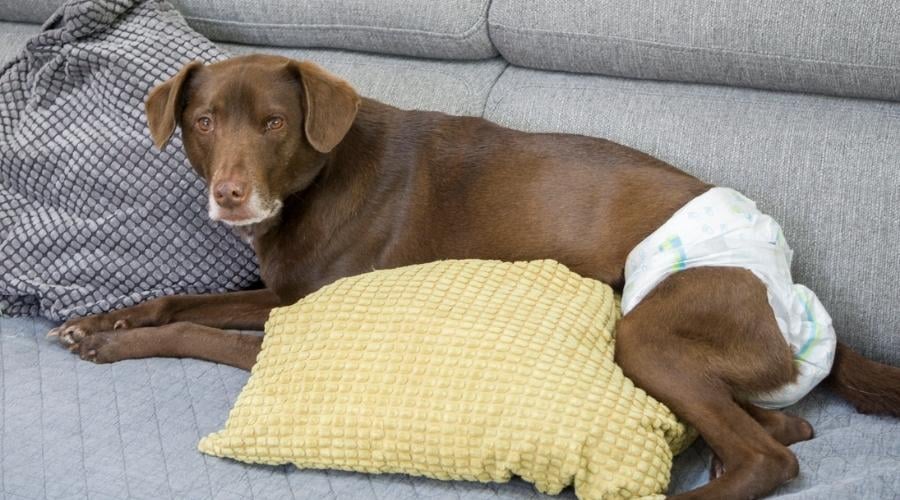
If your dog’s urination habits suddenly change drastically, or they’re showing signs of discomfort, excessive thirst, or blood in their urine, don’t wait. Schedule a vet visit. Increased urination isn’t always serious, but catching problems early on can prevent bigger health issues down the line. You may also want to consider pet insurance, which can help you provide the best care to your pup.
Punishing Your Dog for Peeing? That’s a One-Way Ticket to More Messes
Pro Tip: If your dog has frequent accidents, don’t punish them! Instead, take them out more often and increase supervision indoors. Dogs don’t understand punishment after the fact, but they do understand rewards for doing the right thing. Punishing your dog can worsen the problem and even trigger them to pee more, which is called submissive urination.
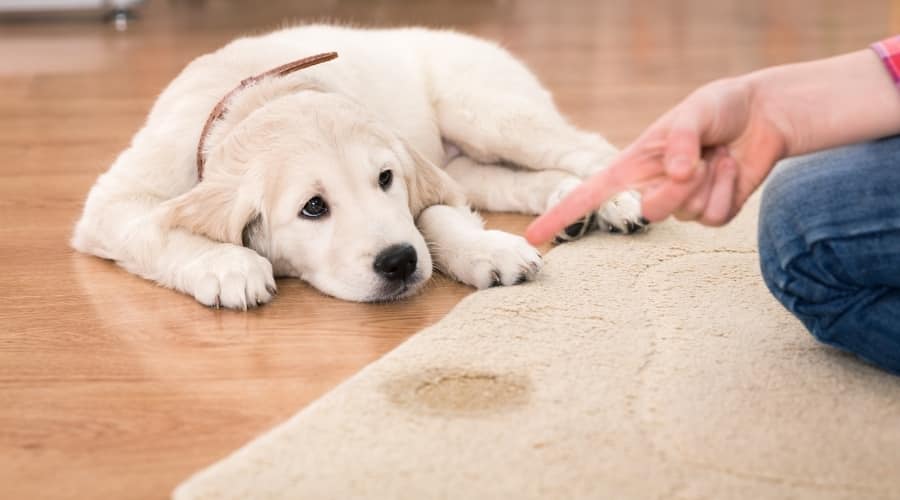
According to information from the UC Davis School of Veterinary Medicine, submissive urination is triggered by fear. It’s best to rule out any medical issues and then address the behavior calmly through training.
How to Stop Your Dog From Peeing So Often (Without Making Them Uncomfortable!)
If your dog is peeing so frequently that you’re considering investing in a mop as part of your daily routine, it’s time to figure out what’s going on. Before assuming it’s just bad habits, it’s important to rule out medical issues first. Once your dog gets the all-clear, it’s time to focus on training, routine, and a few strategic adjustments to help them hold it longer without discomfort.
1. Stick to a Bathroom Schedule
Dogs thrive on routine, and their bladders are no different. A predictable potty schedule helps train them to “hold it” until their designated break times rather than running to the door every 15 minutes. You may want to start by reinforcing some potty training to get things back on the right track.
Start by taking them out at the same times every day, spacing their potty breaks at least 30 minutes apart. Once you get a sense of how often they need to go, you can gradually increase the time between breaks to encourage better bladder control.
This method is especially useful for dogs who seem to think peeing is a fun hobby rather than a biological necessity. If they know when the next break is coming, they’ll be less likely to demand one every time they get bored.
2. Teach a “Go Potty” Command
If you’ve ever stood outside in the freezing cold, begging your dog to just go already while they sniff every blade of grass, this one’s for you. Teaching a potty command can cut down on the time spent waiting for your dog to find the “perfect” spot.
Each time you take your dog outside, use a specific phrase like “Go potty” or “Do your business” as soon as they start relieving themselves. With consistency, they’ll learn to associate the phrase with peeing, making future bathroom trips much quicker.
It also helps to bring them to the same area each time. Dogs are creatures of habit, and if they associate a specific spot with peeing, they’ll get the job done faster instead of wandering around like they’re searching for buried treasure.
3. Reward Good Bathroom Habits
Dogs learn best with positive reinforcement, and bathroom training is no exception. The key is to reward the behavior you want to see more of. This means giving plenty of praise and even a small treat when they pee in the right place at the right time.
If your dog is having frequent accidents, avoid punishment. Yelling at them after the fact won’t help. They won’t understand why you’re upset, and it could lead to anxiety around peeing, which only makes things worse. Instead, focus on catching them in the act of doing it right and reinforcing that behavior.
4. Watch Their Water & Diet
What your dog eats and drinks plays a big role in how often they need to pee. A dog that just finished gulping down a bowl of water after playtime is naturally going to need a trip outside sooner rather than later.
Certain foods can also increase thirst, leading to more frequent urination. Salty snacks or high-fat diets can make dogs drink more water than usual, which means more trips outside.
The type of food they eat matters, too. Dogs on a kibble-based diet tend to drink more water since dry food has little moisture. Dogs on fresh, wet, or raw diets naturally get more hydration from their food. If your dog eats mainly kibble, make sure they have access to plenty of fresh water. Adding a little low-sodium broth or wet food to their meals can also help balance hydration.
5. Consider Indoor Potty Options If Necessary
Frequent potty breaks aren’t possible for some owners, especially those who live in apartments or work long hours. In those cases, indoor potty solutions like pee pads, artificial grass patches, litter boxes, or designated indoor doggy toilets can help prevent accidents. I use an artificial grass patch with my smaller dogs when it is cold outside. I don’t love the clean-up, but it is far better than pee on the carpet.
Indoor potties are particularly useful for small dogs, senior dogs, or those with medical conditions that make holding their bladder more difficult. If you introduce an indoor potty area, be consistent in training your dog to use it, just as you would with outdoor bathroom breaks.
If your dog is peeing more than usual, it is best to schedule a consultation and exam with your veterinarian to be safe. Once you have ruled out health concerns, excessive urination can be handled through training and routine.
Eliminating Dog Pee Odor: Because Your Living Room Shouldn’t Smell Like a Rest Stop
Getting dog urine smell out of the carpet requires more than just wishful thinking and a desperate scrubbing session. First, blot (don’t rub) as much urine as possible with paper towels. Then, soak the area with an enzymatic cleaner designed to break down urine proteins (because regular cleaners just mask the smell, and your dog will still sniff out their crime scene). If you don’t have one on hand, mix equal parts white vinegar and water, let it sit for 10-15 minutes, then sprinkle baking soda over the area like you’re seasoning a bad decision. Let it dry, vacuum it up, and repeat if necessary. If the smell still lingers, it might be time to accept fate. Either get a professional cleaner or start shopping for new flooring.
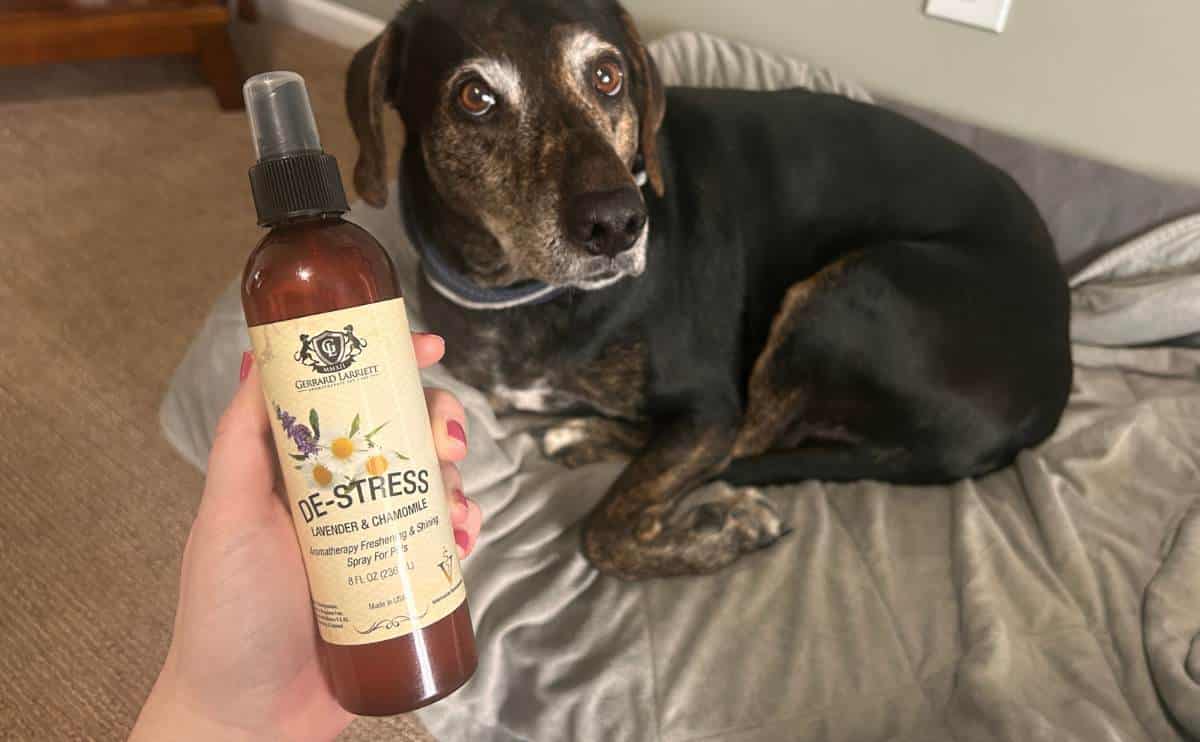
More Fun (and Slightly Disturbing) Facts About Dog Potty Habits
Dog pee isn’t just a bathroom break. It’s a health report, a behavioral quirk, and sometimes, a crime scene waiting to happen. If your pup’s urine smells fishy or downright foul, it’s not just an assault on your nose. It could be a sign of a UTI or other health issue. And if your dog flat-out refuses to pee or poop on walks but immediately lets loose inside? They might be picky about surfaces, anxious about doing their business in public, or just testing your patience.
And then there are the dogs who take things even further: the poop rollers. Some pups happily coat themselves in filth, leaving you to question everything about their life choices (and yours). If rolling in the stinky stuff isn’t gross enough, there are those dogs that like a poop snack. Yep, I’m talking about eating poop. We’ve got guides to cover why dogs circle before they poop, and vet-tested solutions to stop that poop eating habit.
Why Trust Canine Journal?
Danielle has shared a special bond with dogs since childhood. She has over 30 years of experience with dogs of all sizes and dogs with special needs. Danielle is a dedicated professional researcher and pet product reviewer. She spends countless hours researching the latest pet care, health, food, and training developments to help owners learn what’s behind the label. Her two dogs, Daisy and Falkor, serve as in-house food and toy testers. Danielle works with a professional and experienced team to bring the best, most accurate, and most up-to-date information to our readers.
